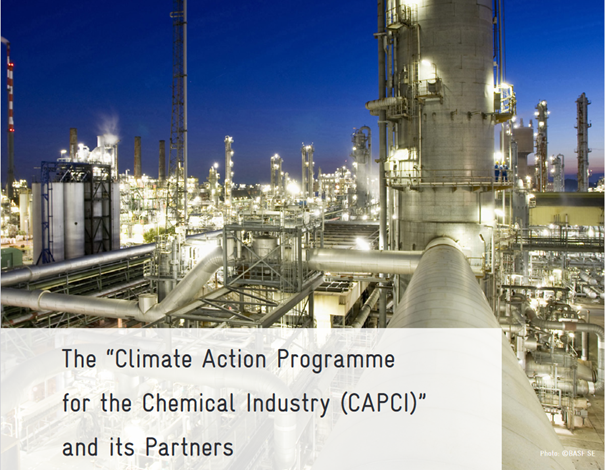Chemicals are omnipresent in our modern economies as well as in our daily lives. They are essential for manufacturing nearly all industrial products, from automobiles and electronics to household goods and textiles, as well as materials needed for developing renewable energy and sustainable mobility solutions. At the same time, however, the chemical and petrochemical industry is highly energy and carbon intense. The sector accounts for around 10 % of the world’s final energy demand (WBCSD 2018)1 and 7.4 % of the global greenhouse gas (GHG) emissions (IPCC 2022)2 when considering emissions directly controlled by the companies (scope 1) as well as those associated with purchased electricity, heat, or steam (scope 2). On the other hand, the chemical industry is in a unique position to develop technologies and products that can mitigate climate change, enhance circularity, and advance sustainability. The transformation to a low-carbon chemical industry requires action on various levels, including technological and political solutions as well as commitment by the relevant stakeholders from government, industry and civil society together with the conviction that a climate-neutral chemical industry is possible.
In the framework of the International Climate Initiative (IKI), the German Federal Ministry for the Environment, Nature Conservation, Nuclear Safety and Consumer Protection (BMUV) has established the Climate Action Programme for the Chemical Industry (CAPCI) to help address these challenges with a special focus in capacity development and the support of selected developing countries and emerging economies. CAPCI is executed by Deutsche Gesellschaft für Internationale Zusammenarbeit (GIZ) and operates in collaboration with global partners such as the International Council of Chemical Associations (ICCA) and the Paris Committee on Capacity Building (PCCB) of the UNFCCC. The activities pursued by CAPCI include both, country-specific and more general topic-specific knowledge-sharing activities at the global level. In five partner countries: Argentina, Ghana, Thailand, Peru, and Vietnam, CAPCI has supported baseline studies and public-private dialogues aimed at identifying priorities, needs and gaps for capacity building among stakeholders from the private, governmental, and academic sector related to the chemical industry and climate protection.
This publication is directed to stakeholders from the private sector, public institutions, civil society, and academia that are related with the production and use of chemicals and/or with climate change, be it in a direct form or indirectly in advisory institutions, research or government and regulatory bodies. It is meant as a contribution to enhance the discussion on sustainable chemistry and climate change, presenting the chemical industry as a key sector for building pathways towards climate neutrality. Furthermore, it shows possibilities for the transfer of knowledge and experiences between industrialized countries and developing or emerging countries as well as south-south collaboration. In detail you will find learning experiences and preliminary results from five CAPCI pilot countries, including insights related with the national baseline studies and national stakeholder dialogues, the results of global webinars from the first phase of CAPCI in 2021, and opportunities for future action.
--
1 World Business Council for Sustainable Development (2018) Chemical Sector SDG-Roadmap. https://www.wbcsd.org/Programs/People-and-Society/Sustainable-Development-Goals/Resources/Chemical-Sector-SDG-Roadmap
2 Intergovernmental Panel on Climate Change (2022) Working Group III contribution to the Sixth Assessment Report of the IPCC, full report. https://www.ipcc.ch/report/ar6/wg3/downloads/report/IPCC_AR6_WGIII_Full_Report.pdf


